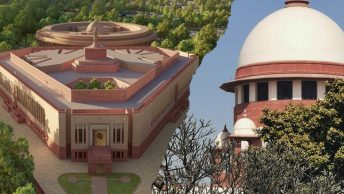The case Anoop Baranwal v. Union of India deals with the system of appointment of the members of the Election Commission of India (“ECI”). A writ petition (WP (C) 104/2015) was filed by Anoop Baranwal which alleged that the current system of appointment violates Article 324(2) and instead advocated for a collegium-like system for the appointment of the ECI members. Article 324(2) of the Indian Constitution deals with the composition of the Election Commission and the method of appointment of its members.
The President is the head of the executive in India and is entrusted with the task of appointment of ECI members under Article 324, subject to parliamentary law being introduced, which hasn’t yet been done. Therefore, Anoop Baranwal filed this petition before the Supreme Court. The key issues framed by the five-judge bench (K.M. Joseph J, Ajay Rastogi J, Aniruddha Bose J, Hrishikesh Roy J, C.T. Ravikumar J) were, whether the current procedure for appointment of the members of the ECI violates the Constitution of India, and whether issuing a direction for the appointment process of the members of the ECI would violate the separation of powers principle.
In the judgment delivered on March 2, 2023, the Supreme Court unanimously held that the selection of all the Election Commissioners including the Chief Election Commissioner would be done by a three-member committee comprising the Chief Justice of India, the Prime Minister and the Leader of the Opposition. This Explainer seeks to break down the arguments presented as well as the findings and rationale of the Court.
Contentions of the Parties
The Petitioners put forth three main arguments. Firstly, the independence of the ECI is an essential prerequisite for free and fair elections. This is in turn is necessary to keep up the spirit of democracy which is part and parcel of the Basic Structure as recognized in the seminal case of Kesavananda Bharati v. State of Kerela. Secondly, since the ECI performs a quasi-judicial function of conducting elections and resolving disputes, the appointment of the members of the ECI solely by the executive may involve the biases of the ruling party. Lastly, they argued a violation of Article 14 since the appointment of the members of the Election Commission is based solely on the advice of the executive which leads to arbitrariness.
The Court’s attention was also drawn to several reports, released by government-appointed commissions that have recommended the introduction of a collegium system for the appointment of ECI members, consisting of the Prime Minister, the Chief Justice of India and the Leader of Opposition in the Lok Sabha. These reports primarily include the 255th report of the Law Commission of India (March, 2015), the 4th report of the Second Administrative Reform Commission (January, 2007) and the report of the Committee of Electoral Reforms (May, 1990), among others. These reports had been ignored and recognising their importance, the Petitioner contended for these to be taken into consideration.
The collegium system is a system of appointment wherein the power to appoint members is not entrusted entirely with the executive. It blurs the separation of powers principle and thus, is not officially a part of the Indian Constitution. The Petitioner’s advocacy for the introduction of this system is justified because it furthers the independence of the ECI which is the fundamental argument put forth. To substantiate the arguments, the petitioner cited several cases which include Advocates-on-Record Association and Another vs. Union of India, Indian National Congress v. Institute of Social Welfare and Others, Prakash Singh and Others vs. Union of India and Others and Vineet Narain and Others vs. Union of India and Another.
The Respondents put forth four main contentions. Firstly, The Union of India pleaded for a strict separation of powers in response to the petitioner’s arguments and contended that the matter relating to the procedure of appointment is a topic of discussion which falls under the purview of parliamentary debates and not the court of law. The Separation of Powers Doctrine, as enshrined under Article 50 of the Indian Constitution deals with the division of executive and judicial functions in the public services of the State. To strengthen this argument, the respondent cited the case of Shamsher Singh v. State of Punjab and Another wherein this doctrine has been explained at length.
Secondly, the mere presence of the power of the Parliament to pass a law relating to the appointment of the members of the ECI does not impose a strict obligation to do so. Thirdly, the Court should only adjudicate on the issue provided it is proved by the petitioners that there has been a complete deviance from the independence of the ECI. However, the Court ultimately did not buy this argument because the Petitioner’s main contention was to retain the independence of the ECI and the requirement of “complete deviance” was not necessary to be fulfilled. Lastly, a person is generally appointed as the Chief Election Commissioner only if they have previously served as an Election Commissioner. Although this isn’t expressly stated in the Constitution of India, this methodology is generally followed because it gives the government a chance to test the reliability and sincerity of the person appointed. The Constituent Assembly Debates discuss how the intention was to only appoint “proper persons”. The Central Government thus looked at the intention of the Constitution framers’ before making this argument. To strengthen the contentions, the respondent also cited the case of T.N. Seshan, Chief Election Commissioner of India v. Union of India.
Judgment and the consideration and reasoning of the judges
The Court considered the arguments made by the parties, the circumstances surrounding this issue and the essential requirements of the law on the appointment of the Election Commissioners before arriving at a decision. There are five major points which have been discussed by the judges in the judgment.
On the first issue of the Union Government not introducing a law to regulate the appointment of the ECI members, the Court upheld this contention and questioned the government, trying to extract the reason behind this omission. The response to this question was unsatisfactory because the Government replied by saying that just because the Constitution gives them the power to make laws, it doesn’t mean that the Parliament can be forced to do so. They further added that some areas require gradual progress.
In terms of the security of tenure and conditions of appointment of the ECI members, the Court noted that the independence of ECI members is completely destroyed because the exception has been made the norm by terminating the services of the members before their actual term of six years is completed because they cross sixty-five years of age. The Court said that the Union Government has constantly been choosing members who are close to attaining the age of sixty-five, right since 2004, thus, interfering with the independence of the ECI. When the respondent put forth the point regarding the appointment of a Chief Election Commissioner solely based on past experience, the Court questioned the basis for this contention, taking into consideration the fact that neither the Election Commission Act, 1991 nor the Constitution imposes such a limitation. Article 324(5) says that the Chief Election Commissioner can only be removed from office in the same manner as a Supreme Court judge. The additional suggestion given by Justice Rastogi in his concurring opinion was to extend this provision to other Election Commissioners as well to ensure the complete independence of the ECI.
On the third issue of the introduction of a collegium system and its composition, the main matter of discussion was whether the Chief Justice of India should be a member of the collegium if the Supreme Court decides to constitute one for the appointment of the ECI members. The Constitutional Bench asserted that it was in favour of this being implemented because it would be the least intrusive solution. The reasoning used was that for statutory bodies, the appointments are made on the recommendations of a broad based committee and so, taking into consideration the far-reaching and important role of the Election Commission, the appointments should be based on a collegium system. The Court did not refer to other solutions because they felt that this reasoning was adequate to rule out the other solutions. To arrive at this conclusion, the Bench also referred to the Background Paper on Electoral Reform drafted by the Ministry of Law and Justice in 2010. Moreover, there have been reports in the past suggesting the same which have been ignored by the Central Government.
In regard to the fourth issue of the Separation of Powers Doctrine, the main concern was whether the judiciary was infringing upon the Separation of Powers Doctrine by adjudicating the matter relating to the appointment process of the ECI members. The Bench clarified that it was not inclined to issue a mandamus to the Government to enact the law and that the order as it stands is an interim measure which the State is bound to follow till the time a law is brought by the parliament. There have been instances in the past where the courts have found it appropriate to come in with stop gap measures, one of the important ones being the Vishakha Guidelines for Sexual Harassment at the Workplace. The Supreme Court had held that sexual harassment is violative of the fundamental rights of the victim. The Court introduced a few guidelines which were taken into consideration by the government while passing the POSH Act. The Court in the Anoop Baranwal judgment has not explicitly referred to any such instance, however, it has referred to the Constituent Assembly Debates before concluding that the framers’ clearly intended that the Parliament should make such a law. The petitioners had also not urged the Court to issue a mandamus.
The fifth important point discussed while dealing with the introduction of the collegium system was the distinction between the freedom to vote enshrined under Article 19 of the Constitution and the right to vote elucidated under Article 326 of the Constitution. Article 326 states that every person who fulfils the essential criteria has the right to cast their vote whereas the freedom to vote stems directly from the fundamental right of speech and expression because it includes the freedom of a voter to exercise his preferences in making a choice between the nominated candidates. This freedom carries with it auxiliary rights such as the right to secure information about the candidate. Thus, the right to vote under Article 326 is a Constitutional right as opposed to the freedom to vote which is a facet of the fundamental right enshrined under Article 19 of the Constitution of India.
The judges mainly looked at the provision in its historical context by examining the Constituent Assembly Debates as well as the wording of the provision and concluded that the Constitution makers had intended to keep the ECI free from the interference of the executive. For this reason they had given the power to the Parliament to make a law related to the appointment of the Election Commissioners. The second consideration of the judges was related to the constantly expanding scope, functions and powers of the ECI which justifies the need for their independence. They considered it necessary to uphold Constitutional democracy, for which conducting free, fair and independent elections is an essential pre-requisite. The third important reasoning given was to protect the independence of the ECI until the Parliament passes a law in this regard. This serves the purpose of filling the gap created because of the Parliament not introducing a law to regulate the ECI appointments.
Conclusion
An amalgamation of these three considerations led to the judgment which deviated from the widely-practiced appointment procedure which has been continuously followed for decades at a stretch, thus making this decision nothing less than a historical one.
The impact of the judgment cannot be accurately ascertained, with contrasting views being aired. Some people are of the opinion that the decision of the Supreme Court in this case violates the separation of powers principle whereas others recognise the importance of this decision to retain the independence of the ECI.
It will be interesting to see if the stop gap order laid down in the present case will influence the Parliament in passing a law related to ECI appointments.
Manav Pamnani is a first-year student at NALSAR University of Law, Hyderabad. This explainer has been written as a part of LAOT’s Legal Writing Mentorship Program, 2023.
READING LIST
Election Commission Appointments , Supreme Court Observer
Tushar Kohli, Making sense of the Election Commissioners’ appointment case before the Supreme Court , Association for Democratic Reforms, December 6, 2022
Gautam Bhatia, Decoding the Supreme Court’s Election Commission Judgment , The Wire, March 4, 2023
Tushar Kohli, Explaining Election Commission of India ruling , The Leaflet, March 10, 2023
Gautam Bhatia, Decoding the Supreme Court’s Election Commission Judgement – II: On the Separation of Powers , Word Press, March 4, 2023
Sohini Chowdhury, Should Election Commissioners Have Same Protection As CEC? Supreme Court Majority Says No, Justice Ajay Rastogi Says Yes , Live Law, March 4, 2023
Soumyabrata Chakraborty, India dispatch: Supreme Court Ruling on Election Commission Appointments Limits Executive Branch Discretion , Jurist, March 8, 2023
Ashwani Kumar, SC’s Election Commission Judgement Upsets a Delicate Balance , Indian Express, March 16, 2023
Sumeda, The Supreme Court’s New Rules for Appointment of Election Commissioners by the President , The Hindu, March 4, 2023
Saptarishi Das, ‘Very Positive and Progressive’: ADR hails SC verdict on ECI Appointments , The Hindustan Times, March 3, 2023
Utkarsh Anand, Independence of Election Commission destroyed by all govts, says Supreme Court , Hindustan Times, November 23, 2022
B.L. Fadia, 1992, Reforming the Election Commission , The Indian Journal of Political Science, vol. 53, no. 1, pp. 78–88
Upendra Baxi, A landmark, but perplexing portent? , India Legal, March 11, 2023







whrd4d
if085m
lrjn8u
91bshp
Bardzo ciekawy punkt widzenia. Nie widziałam tego wcześniej
Absolutnie kocham takie posty. Wartościowe i pouczające
Fantastyczna robota! Widać prawdziwą ekspertyzę
Kocham to